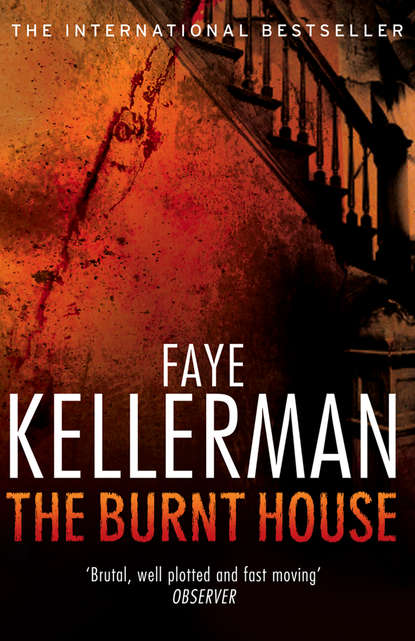По всем вопросам обращайтесь на: info@litportal.ru
(©) 2003-2025.
✖
The Burnt House
Автор
Год написания книги
2019
Настройки чтения
Размер шрифта
Высота строк
Поля
Decker shook his head while trying to digest the captain’s words. “… took down an apartment building. A few firefighters are already at the scene, but the local units are going to need reinforcements ASAP. All units are being directed to Seacrest and Belarose. We’re planning tactical.”
“I’m ten minutes away.”
“You got a roof light in your vehicle?”
“Yes.”
“Use it!” The captain hung up.
“What?” Rina was pale.
“Plane crash—”
“Oh my God!” Rina gasped.
“It landed on an apartment—” Decker stopped talking, his ears picking up the wail of the background sirens. He glanced back at the TV screen.
“Where?”
“Seacrest—”
“Where on Seacrest?”
“Between Hobart and Macon.”
“Peter, that’s about five minutes from Hannah’s school!”
“Go get the Volvo. I’ll convoy you over with the siren in the unmarked and then go out to the scene.”
Rina’s eyes were still glued to the TV screen. Unceremoniously, Decker turned it off. “You can listen on the radio. Let’s go!”
Rina snapped out of her stupor, realizing the extent of what was to follow. A very long day followed by a very, very long night. She wasn’t going to see him for the next twenty-four hours. But unlike the people on the plane, she would see him again. Her heart started racing, her throat clogged up with emotions, but words escaped her.
Once they were outside, she found her voice. “Be careful, Peter.”
He nodded, but he wasn’t paying attention. He opened the car door for her and she slipped inside. “I love you.”
“Love you, too. And yes, I will be careful.”
“Thank you. I didn’t think you heard me.”
“Normally, I probably wouldn’t have, but right now I could hear a butterfly. That’s what happens when overdrive kicks in. All senses suddenly warp speed to hyperalert.”
LIKE MOST PRIVATE schools, Beth Jacob Hebrew Academy High School—grades nine through twelve—had recently flexed its flaccid muscles against its overindulged adolescent inhabitants. Teachers, tired of beeps, whistles, and ring tones interrupting lessons, complained to the administration that in turn passed a draconian law—according to fourteen-year-old Hannah Decker—that prohibited the possession of any electronic gadgets, the sole exception being calculators for advanced math. The ordinance had gone into effect three weeks prior—a case of poor timing because with the land phones out, the school was frantically trying to reach parents on the limited cell phones that it had.
Most of the parents had an inkling that something was wrong, so by the time Decker and Rina pulled up, there was already a line of SUVs waiting to haul away the children.
Decker got out of the unmarked and walked over to Rina’s Volvo. His nostrils flared at the acrid smell of smoke, his eyes watering from floating ash. He put his hand over his mouth and motioned for her to roll down the window. “How’s our food and water supply in the house?”
“You know me. We have enough for the entire neighborhood.”
“Good. Go home and don’t go out. The air’s horrible and is only going to get worse in the afternoon when the winds pick up. Are you going to be okay?”
“Absolutely,” Rina said. “Go, Peter. And thanks for getting me here so quickly.”
“She’s my daughter, too. Give her a kiss and tell her I love her.”
“I will.”
Decker returned to the unmarked, now sandwiched between Rina’s Volvo and a Lincoln Navigator. He turned on the siren, it squawked, and the car behind him gave him an inch of backup room. A minute later, he was on the boulevard, using his wipers to clear white ash from his windshield. Even with the siren, the normally five-minute drive took much longer. All the traffic signals were out and the roadways were clogged with vehicles. Weaving in and out of the tiny spaces allotted to him by his siren, Decker managed to reach ten blocks from the appointed spot before he espied the yellow police barricade tape. Miraculously, he found a parking space that didn’t block the street or any driveway. The scorched atmosphere was thick with ash falling like rain. Even with the door closed and the windows up, there was a sickening, permeating stink of jet fuel and molten metal and wood that burned his throat.
As a detective lieutenant, Decker was choosy about his field visits when a crime was called in. But he was always prepared, and that meant he had latex gloves and face masks in the console of his car. He slipped on the mask, wishing he had goggles as he opened the door.
Immediately his face was hit by a heavy slap of hot air. The sky billowed with black smoke and the occasional leap of an orange flame. He showed his badge to a uniform, also wearing a face mask, whose assignment was to patrol the borders of the yellow tape. The kid’s eyes were jumpy as Decker stepped over the tape.
God, they made them young these days.
As he edged closer to the disaster, visibility was reduced to soup, the fire’s roar pounding in his ears like crashing waves. He could make out a plethora of fire trucks: departments of every stripe had been called down to the scene. There were ambulances of all colors and makes. Sirens wailed and strobe lights flashed through the misty darkness. Human figures skittered about like gnats.
When he got within a half block of the rendezvous location, he spotted a trio that could have been anyone, but by their height and shape, Decker surmised that they were Marge Dunn, Scott Oliver, and Wanda Bontemps. With every forward step, the stench grew stronger—fuel oil, charred wood, boiling metal. He could barely hear himself think because of the screech of lapping flames, sirens, and human screams. Trained as a medic in Vietnam, Decker had seen destruction and chaos, but none of his war experiences could have prepared him for this.
When he was within striking distance, Decker saw that his identity assumptions had been correct. Marge Dunn, Scott Oliver, and Wanda Bontemps were sweating under protective gear—slicker coats, mouth masks, and goggles. Marge waved Decker over and handed him a slicker and a pair of goggles. She shouted, “Strapp told me to bring these for you.”
“Smart thinking,” Decker shouted back. “How long have you been here?”
“About three minutes and that’s too long,” Marge hollered. She was a tall woman but seemed bent over and consumptive under the weight of smoke and a heavy protective coat. Her forehead was soaked and dirty.
Decker said, “Does anyone know what crashed?”
“WestAir out of Burbank,” Wanda Bontemps screamed. “A commuter airlines. I heard there were around forty-five aboard?”
“God, that’s awful,” Decker said. “Terrorism or mechanical failure?”
Shrugs all around. Stupid question. How the hell should they know? His mouth was speaking before the brain kicked in. Decker felt a vibration on his chest. His cell was ringing. He shouted into the receiver. “Scream or I won’t be able to hear you.”
It was Strapp, and even though the captain was shouting, Decker could barely make out his words. He plugged up his other ear with his finger. “Okay … will do … I’ve got it.” He returned the cell to his pocket. “He’s stuck in traffic from a tactical meeting. First thing we need to do is evacuate the residential area in an orderly fashion. Let’s work within a ten-block radius outside the yellow tape line. The fire marshals are clearing the area within the barricades.”
Decker managed to extract a notepad from his suit jacket.
“First, let’s get the ghouls and the lookie-loos out of here. Wanda, if you take care of that, we get some clear lanes for emergency vehicles. Anyone who doesn’t leave immediately is subject to arrest. Marge, you coordinate with traffic. Take a bunch of uniforms, station them at every other intersection, and set up some kind of traffic escape route. Oliver, let’s work out an orderly grid of the area. I’ll start grabbing as many detectives and officers as I can so we can start knocking on doors.”
As expected in the ensuing pandemonium, the biggest problem was cars jamming up the streets. Panicked folk were packing cherished belongings, stuffing their valuables into cars, trucks, and vans. This particular vicinity was a neighborhood of solid homes with dens, big TVs, and lots of electronics. Some of the houses had pools, and decks and barbecues. All of that could be replaced. It was all the silly items abandoned inside that made people weep: the photo albums, vacation souvenirs, the knickknacks, and the curios.
As soon as Oliver got a decent grid map, Decker made his assignments to his waiting detectives, saving the evacuation of the area nearest to the crash for himself. There was a bullhorn on each block telling people that they had to leave their homes now. That was fine for people with cars, but what about those who were without transportation? What about the sick and the elderly?
Decker began to knock on doors.
The first house in his area belonged to a woman with two small children. She was very thin, her dark hair covered with ash, turning it gray. She coughed as she cried, hauling out a brown box filled with items that were obviously important to her. Her two small children were already strapped into car seats.











